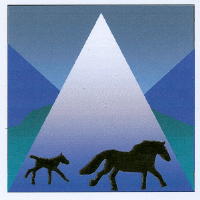The Matter of the Microbiome
/As a breeder, I know that ponies I sell are affected by changes in location and management. It’s therefore a topic I ponder on a regular basis since I’m finding new homes for ponies on a regular basis. It was natural for me, then, to ponder the impact of change on an entire herd of ponies when I learned of changes afoot. So when I then learned of research addressing the topic from a perspective I’d never considered before, I was immediately curious.
The research involved a comparative study of the gut microbiomes of two equine populations living adjacent to each other. Gut microbiomes play crucial roles in health, “…such as training the immune system early in life, metabolism, and synthesis of vitamins.” (1) The research was inspired by findings that in humans, “…lifestyle strongly influences the composition and diversity of the gastrointestinal microbiome.” (2) The researchers hypothesized that domestication of equines, which involved a significant change in lifestyle, has impacted the quantity and diversity of their gut flora. Similar changes have been documented in comparative studies of hunter-gatherers and modern day humans. For the comparative analysis, the researchers studied a herd of Przewalski’s horses, thought to be the only undomesticated equine population, and a herd of domestic horses living on a range next door. Both herds were in Mongolia. The researchers used fecal microbiomes as a proxy for gut microbiomes.
The researchers found that the primitive horses had distinct and more diverse populations of fecal microbes than the domesticated horses. They also found that the primitive horses that had been born in zoos and relocated to the wild range had a different microbial profile than the primitive horses that had lived their entire lives in more natural conditions. The researchers concluded that it was likely that diet played at least a partial role in the different microbial populations. The dietary differences were in part due to availability but also due to choice. The exact role of dietary influence on microbiome populations requires further study.
The reason that I had been pondering the impact of change in location and management of an entire herd of course has to do with Fell Ponies. A herd of Fell Ponies has recently been moved onto a fell farm in Cumbria. Many of the ponies have never been on a fell, and the common knowledge in our breed is that it takes Fell Ponies homed away from the fell years if ever to adjust to being re-felled. I have been pondering what questions we might ask to study this herd and its re-felling.
Questions about the fecal microbiome of the ponies hadn’t occurred to me regarding the herd being re-felled. But this research suggests that there may be differences in microbiomes between ponies living on the fell and ponies living elsewhere. Perhaps there is a role for microbiome manipulation in helping ponies be re-felled. It would be fascinating to find out!
Metcalf, Jessica, et al. “Evaluating the impact of domestication and captivity on the horse gut microbiome,” Scientific Reports, 14 November 2017, as downloaded 8/17/18 from https://www.nature.com/articles/s41598-017-15375-9.pdf
Same as #1.



